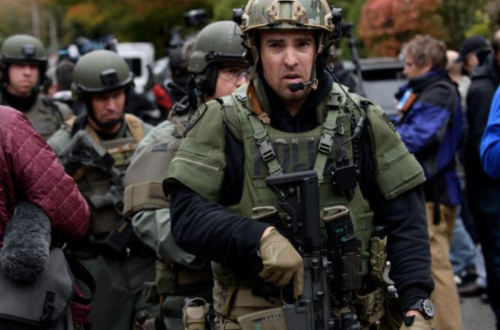This is a guest post by Professor Alan Johnson
The Guardian columnist Deborah Orr has written a controversial and very heavily criticized article about the Gilad Shalit deal. She has argued that ‘the prisoner swap between Hamas and the Israeli government [is] an indication of how inured the world has become to the obscene idea that Israeli lives are more important than Palestinian lives [and] tacitly acknowledges what so many Zionists believe – that the lives of the chosen are of hugely greater consequence than those of their unfortunate neighbours.’ (Emphasis added)
There are three obvious things to say about Orr’s outburst, and one not so obvious. First, it was not a ‘swap’; it was kidnap and extortion. Second, Netanyahu certainly did not see it as ‘fair’ but rather as excruciatingly unfair, dictated by Hamas, but the only way to get Gilad Shalit back. Third, the claim that the release of 1027 Palestinian prisoners for 1 kidnapped Israeli is evidence that ‘the chosen people’ – she means Jews – think less of the Other is absurd. For one thing, Hamas dictated the terms. For another, the TV coverage showed healthy, well-fed and in some cases well-educated Palestinians who had acquired degrees in prison, while Gilad, by contrast, was hollow eyed and emaciated after being denied Red Cross visits or sunlight.
The not so obvious point to make about Orr’s article concerns her dangerous talk of the ‘chosen people.’ For with this kind of talk, the Guardian really is playing with matches.
The late Steve Cohen, a radical left-winger and a Jew, will be remembered for writing a marvelous book with a marvelous title. ‘That’s funny, you don’t look anti-Semitic’ told the whole sorry and jaw-dropping tale of left-wing anti-Semitism. (You can read it here, courtesy of Engage.)
Steve argued that misunderstandings of the ‘chosenness’ of the Jewish people were one driver of anti-Semitism on the left. He explained:
The Socialist Workers Party has also articulated its own variant of the conspiracy theory—making the fantastic allegation about Zionism that, “its essence is that a ‘chosen people’, the Jews, are superior to everyone else and should trample on the rights of other peoples” (20.10.73).
Steve pointed out how wrong-headed this ‘superior-therefore-can-trample’ trope was. And how dangerous.
A Marxist approach to the ‘essence’ of Zionism would look at its social roots—which manifestly lay in the reaction of the Jewish masses to the pogroms of the late nineteenth and early twentieth centuries, and to Nazism. It seems that Socialist Worker imagines that Zionism emanates from a mysterious plot in which Jews see themselves as the “chosen people”—a biblical reference which is seemingly equivalent to modern ‘master race’ theories and in which Jews believe themselves ‘superior to everyone else’. The SWP has substituted, at least on this occasion, a materialist analysis of Zionism for an idealistic one—and one that is completely anti-Semitic.
Steve showed how far-right and far-left have sometimes shared the anti-Semitic belief that the biblical notion of the ‘chosen people’ lies at the root of a pernicious Jewish power-seeking. The common theme, he observed, is that ‘the Judaic religion is … both the basis of Zionism and … a faith which preaches genocide and the enslavement of gentiles.’
In 1982 the fascist magazine Spearhead claimed that Zionism was based on the belief by Jews that they were “God’s chosen people”. But Communists involved in the Soviet Union’s global ‘anti-Zionist’ campaign of the 1970s and 1980s had long struck the same note. The Soviet academic Kichko wrote in his book Judaism and Zionism that ‘Judaism teaches that Jews should force the subjugated people in the invaded lands to work for them as a people of priests.’ Cohen also pointed to the vicious writings of the Stalinist Vladimir Begun. In Creeping Counter Revolution Begun argued that ‘Zionist gangsterism … has its ideological roots in the scrolls of the Torah and the precepts of the Talmud.’ (both quotes taken from The Left Against Zion, edited by Robert Wistrich).
Sadly, this ‘they-think-they’re chosen-therefore-they’re-genocidal’ trope has been bleeding into the mainstream. No less than Portuguese Nobel Prize in literature José Saramago wrote that Jews were ‘contaminated by the monstrous and rooted “certitude” that in this catastrophic and absurd world there exists a people chosen by God and that, consequently, all the actions of an obsessive, psychological and pathologically exclusivist racism are justified.’
And of course, theologically-speaking, it’s all nonsense. Jeffrey Goldberg has pointed out at the Atlantic that ‘”Chosenness” in Jewish theology actually means “burdened,” as in, Jews are burdened by their faith with special responsibilities to carry out what Judaism understands to be God’s wishes. Chosenness does not mean “exclusive” or “more equal than others.” It never has, except to anti-Semites.’
The Israeli novelist David Grossman has written movingly of the Jews ‘spiritual, moral mission, to be a “light unto the nations,” to be the voice of the weak and oppressed everywhere.’ The mission, he points out, is not to dominate, but to ‘see in every person a great creation, unique and unrepeated, in the spirit of Isaiah’s prophecy and the prophecies of modern thinkers such as Franz Rosenzweig, Martin Buber, and George Steiner.’ Now one can respond to that by urging Israel to live up to its moral mission. Or roll one’s atheist eyes. But one can’t call that beautiful idea – which of course, thanks to the Jews, is our western idea – ‘obscene.’
Orr’s article was illustrated online by a photograph of Wafa al-Biss, one of the freed Palestinian prisoners, surrounded by cheering schoolchildren in the northern Gaza Strip. What the Guardian did not inform the reader is that the failed suicide bomber told the children that ‘I would be a suicide bomber three times over if I could’ and urged these unformed minds to follow her example. Speaking afterwards she said ‘We shall continue on this path of struggle and resistance and martyrdom, and this is what I told the children.’ And who had al-Biss tried to blow up? The doctors and nurses of the Soroka Hospital in Israel who had been treating her, for free, for several months. Now that really is a case of devaluing the Other.
This post was offered to Comment is Free but was declined.
UPDATE
Also see Eve’s piece at Engage
The ‘chosen’ ones are meant to be Jews, of course, notwithstanding Orr’s fig-leaf reference to Zionists; the phrase long predates the State of Israel. The ‘Chosen People’: that’s how Jews are supposed to think of themselves. Now it so happens that during my childhood, I never once heard Jews refer to themselves as the Chosen People. I was aware in some imprecise way that there was a theological view about chosen-ness, but this was primarily a matter of the burden of observation and practice which orthodox Jews were required to carry by a covenant with God. It was nothing to do with the lives of Jews being worth more than those of other people, and in any case the view in question didn’t resonate at all with those Jews who weren’t religious, and was never held by them. Indeed, it was never very likely that European Jews, in the shuddering aftermath of the mid-century genocide, would regard themselves as being extraordinarily important or strong or powerful – any use by them of the ‘Chosen People’ trope would have been bitterly and painfully ironic. But although I can’t of course speak for others, I myself never heard it used by Jews; the only contexts in which I came across this phrase were ones in which it was deployed by those who disliked Jews, who wanted to sneer at or denigrate them. And even in that usage I didn’t come across it too often – in the first two or three decades after the Second World War people who didn’t like Jews were often ashamed to reveal their hostile feelings in public.
Things are different now, and this trope has been resurrected for the same old use: to denigrate Jews and stir up dislike, or worse, against them.


